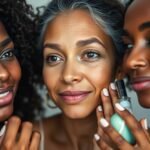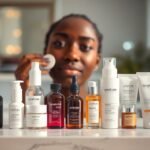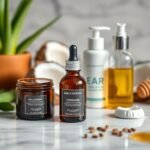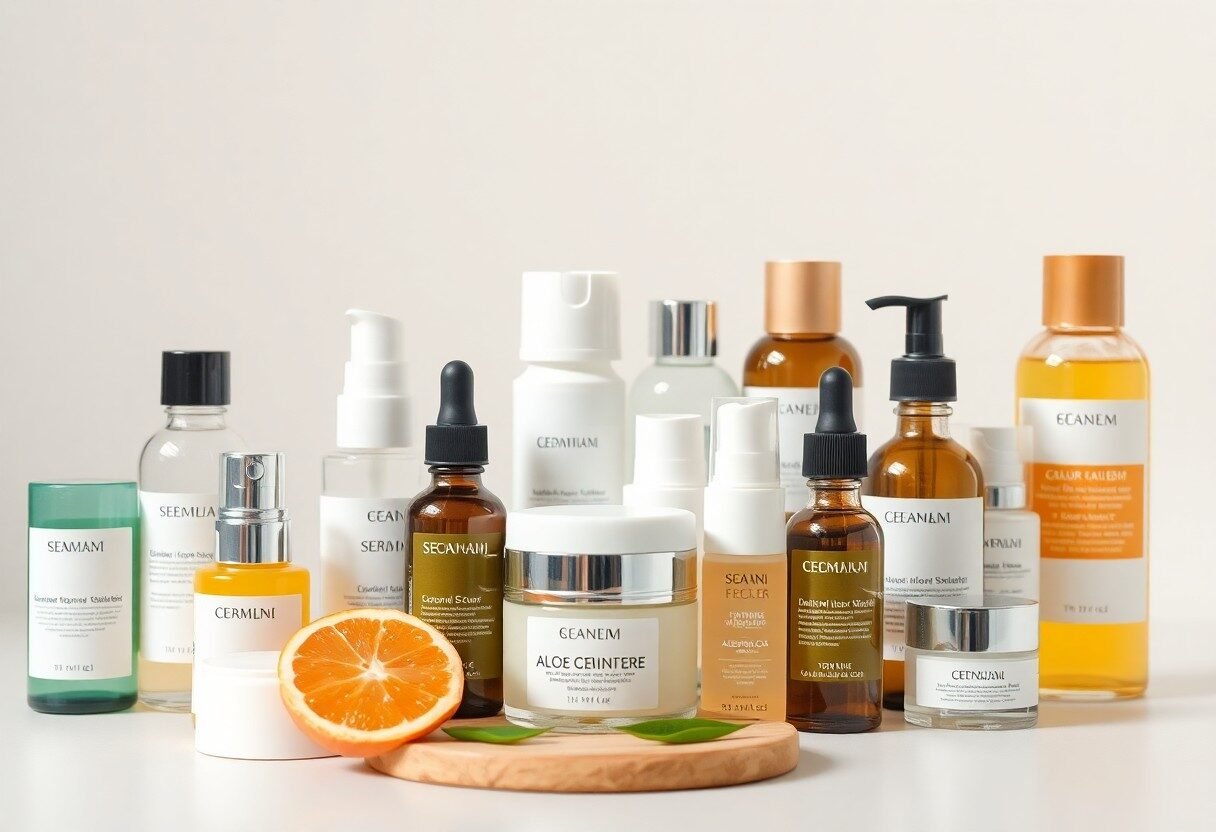
Skincare can be a transformative journey, especially when addressing issues like discoloration and uneven skin tone. You may feel frustrated by dark spots or patches that disrupt your complexion, but the right products can make a significant difference. I’ll guide you through the necessarys I’ve learned to help you choose effective ingredients and formulations that target these concerns. With the right approach, you can achieve that radiant skin you’ve always desired.
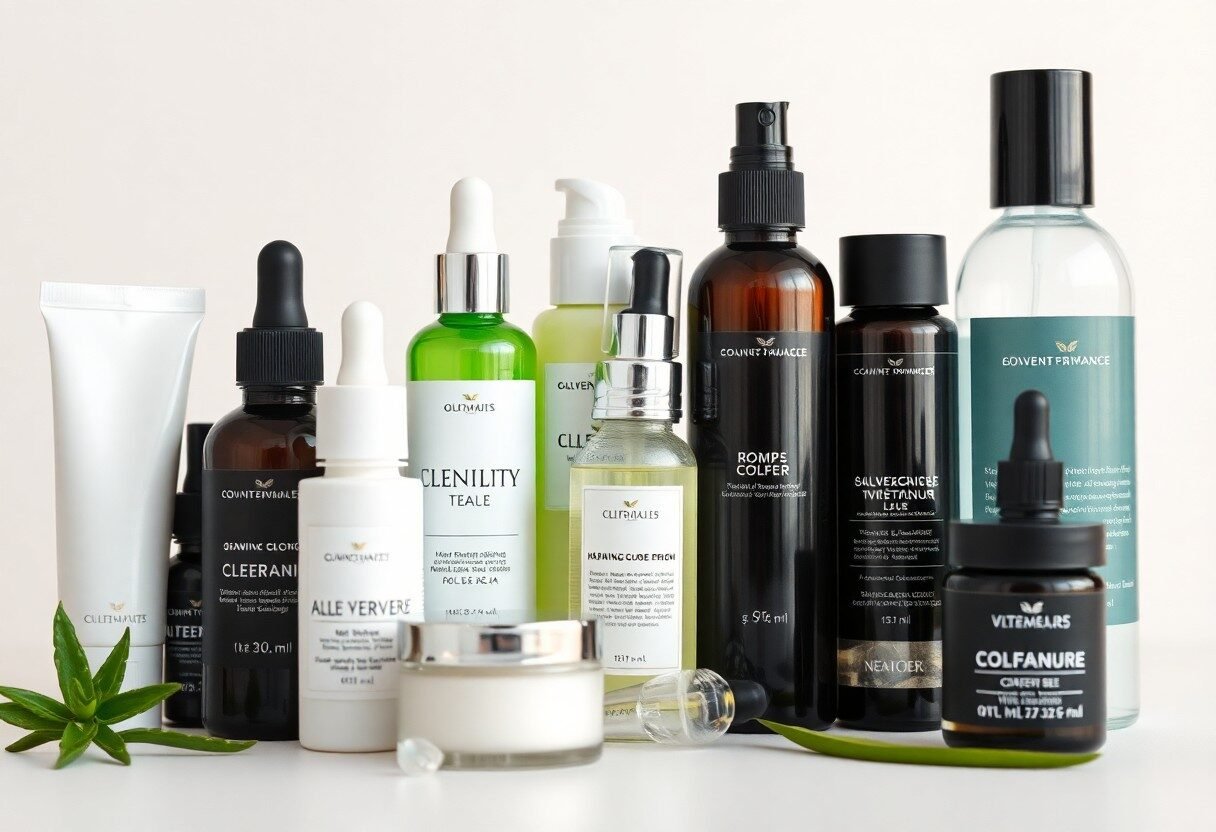
Key Takeaways:
- Identify the type of discoloration: Different causes require different treatment approaches, such as sun damage, post-inflammatory hyperpigmentation, or melasma.
- Incorporate ingredients like Vitamin C, niacinamide, and alpha arbutin to brighten skin and reduce the appearance of dark spots.
- Consider exfoliation as part of your routine: Chemical exfoliants like AHAs and BHAs can help to remove dead skin cells and promote cell turnover.
- Use broad-spectrum sunscreen daily to prevent further discoloration and protect against UV damage, which can worsen uneven skin tone.
- Maintain consistency in your skincare routine: Regular use of targeted treatments will yield the best results over time.
- Consult with a dermatologist for personalized recommendations, especially if over-the-counter products are not effective.
- Paitence is key: Skin tone correction can take time, varying from weeks to months depending on the severity of discoloration.
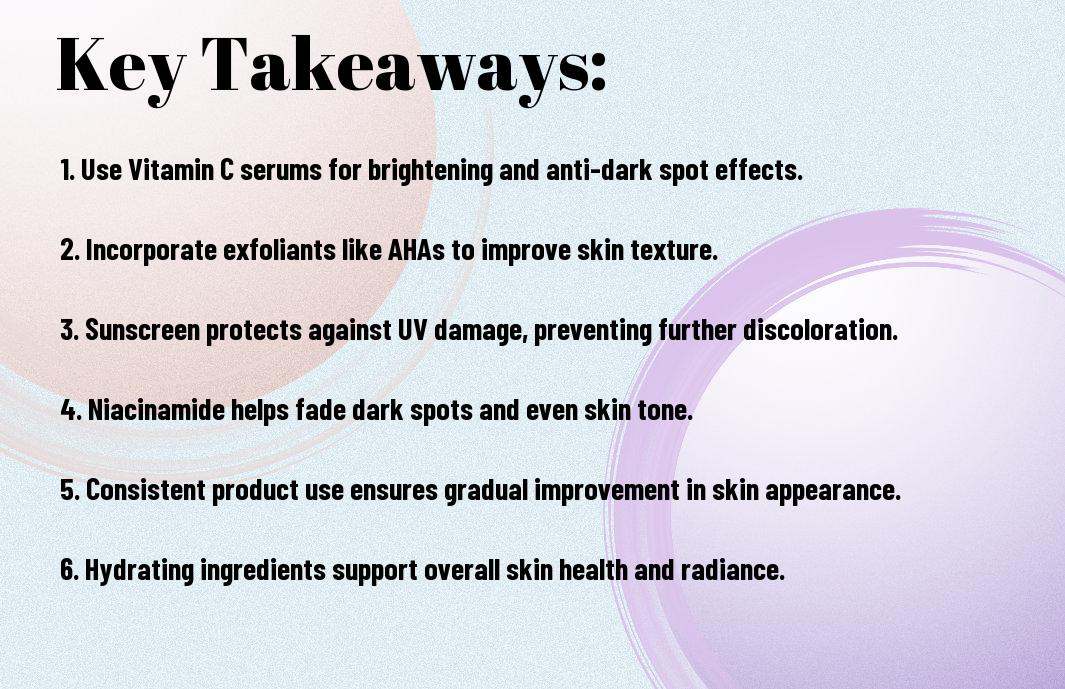
The Skin’s Color Palette: Unpacking Discoloration Causes
Discoloration and uneven skin tone can stem from a variety of underlying issues, making it vital to understand the root causes. Factors such as genetics, hormonal changes, UV exposure, and environmental impacts play significant roles in how our skin color presents itself. By discerning these causes, I can better tailor my skincare routine and select the most effective products to address discoloration.
Intrinsic Factors: Genetics and Hormonal Changes
Genetics and hormonal shifts profoundly influence skin coloration. Your skin tone, susceptibility to hyperpigmentation, and even reactions post-acne can often be traced back to your genes or hormonal fluctuations during life stages such as puberty, pregnancy, or menopause.
- Genetics: inherited traits affecting pigmentation levels.
- Hormonal changes: fluctuations causing discoloration.
- Skin type: inherent differences in melanin production.
Perceiving these intrinsic factors will guide your approach to treatment and enable you to focus on products designed for your specific skin conditions.
Extrinsic Factors: UV Exposure and Environmental Impacts
External factors like UV exposure and environmental pollutants can trigger skin discoloration significantly. Prolonged sun exposure can lead to sunspots and contribute to an uneven skin tone. Additionally, pollutants in the air can cause oxidative stress, leading to premature aging and dark spots.
- UV exposure: a major contributor to pigmentation changes.
- Environmental pollutants: damage leading to uneven skin tone.
- Oxidative stress: responsible for skin aging.
After identifying these extrinsic factors, implementing sun protection and addressing pollution-related damage become vital steps toward achieving an even skin tone.
Environmental factors are not just limited to the sun. Daily exposure to pollutants, humidity, and even lifestyle choices like diet and stress can exacerbate skin issues. For example, living in an urban area with high pollution levels may require additional cleansing steps to remove built-up grime, while proper sunblock can prevent the formation of dark spots from UV exposure. After understanding these connections, I find it easier to select targeted skincare products that help combat the effects of external aggressors and promote a more uniform appearance.
- Pollutants: contribute to skin fatigue and discoloration.
- Healthy lifestyle choices: can mitigate environmental impacts.
- Targeted treatments: vital for correction of skin tone.
After recognizing how external influences can affect my skin, I am empowered to make informed choices that aid in achieving an even complexion.
Decoding Ingredients: What to Look for in Skincare
Being savvy about skincare ingredients can transform your routine and help you combat discoloration effectively. Look for formulations that feature potent active components tailored to your skin’s unique needs. Prioritize products with research-backed ingredients that provide visible results, while also being mindful of how your skin reacts. Knowing how to decode the labels empowers you to choose the right products that directly tackle uneven skin tone.
Brightening Agents: Vitamin C, Niacinamide, and More
Brightening agents like Vitamin C and Niacinamide are stars in the fight against uneven skin tone. Vitamin C, a potent antioxidant, helps to inhibit melanin production, thus fading dark spots and brightening your complexion. On the other hand, Niacinamide reduces inflammation and redness, while also improving skin texture. Including these ingredients in your routine can lead to a more radiant, even-toned appearance.
Exfoliants and Chemical Peels: Alpha and Beta Hydroxy Acids
Exfoliants, particularly Alpha Hydroxy Acids (AHAs) and Beta Hydroxy Acids (BHAs), are invaluable in your skincare arsenal. AHAs, like glycolic and lactic acids, promote cell turnover and help slough off dead skin, revealing a brighter complexion underneath. BHAs, such as salicylic acid, are oil-soluble, making them particularly effective for acne-prone skin by penetrating and clearing out pores. Both types work to reduce the appearance of dark spots and contribute to an overall more balanced skin tone.
Incorporating AHAs and BHAs into your skincare routine can lead to remarkable changes. Typically, using these acids 1-3 times a week can yield effective results without overwhelming your skin. For anyone looking to improve texture and fade discoloration, products containing glycolic acid offer gentle yet impactful exfoliation, while salicylic acid is ideal for calming breakouts. Always consider a patch test when introducing new actives, as your skin health should take precedence in achieving that clear, even complexion.
Targeted Products That Deliver Results
Focusing on targeted products can make a significant difference for your skin concerns. Incorporating effective serums, moisturizers, and sunscreens designed explicitly for uneven tone and discoloration can yield visible improvements. Selecting products with potent active ingredients helps to directly address specific issues, leading to healthier, more uniform skin over time. Whether you’re managing hyperpigmentation, dark spots, or overall dullness, the right combination can give you the confidence to flaunt a vibrant complexion.
Serums: Concentrated Solutions for Specific Issues
Serums provide a powerful punch of concentrated ingredients that work deeply within the skin. Look for serums with vitamin C, niacinamide, or retinol for their proven ability to brighten skin tone and diminish dark spots. I’ve personally seen a difference using a vitamin C serum, which not only brightened my complexion but also improved overall texture. By targeting the root causes of discoloration, these serums empower you to achieve results faster.
Moisturizers and Sunscreens: Daily Defense Against Discoloration
Daily moisturization plays a key role in preventing discoloration by maintaining skin hydration. Opt for moisturizers containing hyaluronic acid and shea butter to boost moisture levels and create a barrier against environmental aggressors. Equally important is the use of sunscreen; broad-spectrum SPF 30 or higher protects against harmful UV rays that can exacerbate discoloration. I’ve found that layering a tinted moisturizer with SPF not only evens out my skin tone but also defends my skin against further damage, ensuring I have the radiant glow I strive for.
Incorporating a well-formulated moisturizer with antioxidants can help fight off free radicals, while a lightweight sunscreen shields against UV exposure, a primary contributor to uneven skin tone. Look for options that offer hydration along with sun protection, ideally with physical blockers like zinc oxide or titanium dioxide. I’ve discovered that using a tinted hydrating sunscreen not only provides coverage but also helps to unify my complexion, allowing my natural skin to shine through while minimizing imperfections.
Building an Effective Skincare Routine
Developing a consistent skincare routine tailored to your specific needs can amplify the benefits of targeted treatments for discoloration and uneven skin tone. This involves selecting products based on your skin type, concerns, and the order in which to apply them. Consider incorporating cleansers, toners, serums, moisturizers, and sunscreen into your regimen. Regularly assessing your skin signals the need to tweak your routine, ensuring it remains effective and relevant as your skin changes.
Morning vs. Nightcare: Timing Your Treatments
Morning and nightcare routines serve distinct purposes in skincare. During the day, the goal is to protect your skin from environmental stressors, so I recommend focusing on sun protection with SPF, antioxidants, and lightweight moisturizers. Nighttime routines, however, should prioritize recovery and repair. This is an ideal time to apply potent treatments that address discoloration, as your skin rejuvenates while you sleep, maximizing the efficacy of serums and nourishing ingredients.
Layering Products for Maximum Efficacy
Achieving optimal results from your skincare products requires thoughtful layering. Start with the thinnest consistency first, generally a cleanser or a toner, followed by serums tailored to your skin concerns, like vitamin C for brightening. A lightweight moisturizer should seal in the previous layers, while heavier creams or occlusives can be applied last for added hydration and protection. This layered approach not only enhances absorption but also allows each product to perform its function effectively, working synergy to tackle discoloration and promote a more even skin tone.
For instance, using a vitamin C serum followed by a hyaluronic acid booster can significantly elevate skin hydration while combating signs of discoloration. Additionally, layering products might involve using a gentle exfoliant on a non-consecutive night to remove dead skin cells, followed by a retinol treatment that helps with uneven skin tone. Each step increases product penetration, ensuring your skin reaps the full benefits, showcasing a radiant, more uniform appearance over time.
Contextualizing Skin Tone: Cultural Perceptions and Societal Impacts
Understanding skin tone extends beyond personal beauty; it reflects deep-rooted cultural perceptions and societal impacts that shape how we view ourselves and others. Different cultures often attribute varying values to specific skin tones, influencing everything from opportunities in employment to social interactions. Many people find themselves navigating these complex dynamics, where beauty ideals can lead to a pursuit of lighter or darker skin, ultimately affecting mental health and self-esteem.
Global Attitudes Towards Skin Tone and Beauty Standards
Beauty standards differ considerably across the globe, often dictated by cultural history and societal norms. In many Western societies, fair skin has traditionally been regarded as a mark of beauty, while in certain regions, deeper skin tones signal strength and resilience. For example, countries in Asia frequently see marketing that promotes lighter skin, whereas in Africa, there is growing pride in natural, darker complexions. These perspectives illustrate the intricate dance between beauty, identity, and societal values.
The Role of Marketing in Skincare Product Choices
Marketing heavily influences our skincare choices and perceptions of beauty. Brands often target consumers based on prevailing beauty standards, using specific imagery and messaging that can either reinforce or challenge societal norms. Campaigns promoting skin-whitening products are prevalent in some regions, perpetuating the notion that lighter skin is more desirable, while others encourage embracing natural skin tones. As a consumer, it is vital to recognize how these marketing tactics shape our preferences and buying decisions. By being discerning, you can champion the normalization of diverse beauty and choose products that align with your values.
Marketing strategies often employ psychological tactics that prey on insecurities, making us feel inadequate unless we conform to a specific standard. For example, ads frequently depict models with flawless skin, creating an aspirational narrative that suggests achieving similar results is only possible through their products. In contrast, brands that celebrate diversity and reflect real-life imperfections resonate more authentically. By supporting these inclusive initiatives, you not only enhance your skincare routine but also contribute to a broader cultural shift towards acceptance and appreciation of all skin tones.
Final Words
To wrap up, addressing discoloration and uneven skin tone can be achieved with the right skincare products tailored to your unique needs. I encourage you to explore ingredients like vitamin C, niacinamide, and exfoliating acids that can effectively help even out your skin tone. When you commit to a routine that includes these powerful components, along with sun protection, you’ll be well on your way to achieving a radiant complexion. Always be patient and consistent, as visible results take time, but your skin will thank you for the effort.
FAQ
Q: What causes skin discoloration and uneven skin tone?
A: Skin discoloration and uneven tone can result from various factors, including sun exposure, hormonal changes, aging, acne scars, and certain skin conditions. Environmental stressors and poor skincare habits can also contribute to these issues.
Q: How do I know which skincare products are right for targeting discoloration?
A: Look for products that contain active ingredients known to address discoloration, such as vitamin C, niacinamide, retinoids, and hydroquinone. It’s important to choose formulations that suit your skin type and to patch-test new products to avoid irritation.
Q: Can natural ingredients help with uneven skin tone?
A: Yes, several natural ingredients can be beneficial in targeting uneven skin tone. Ingredients like licorice root extract, aloe vera, and mulberry extract have skin-brightening properties. However, the effectiveness can vary, and it may take longer to see results compared to some synthetic products.
Q: How often should I apply products aimed at treating skin discoloration?
A: The frequency of application can vary by product and individual skin tolerance. Generally, serums containing active ingredients can be applied once or twice daily, while other treatments may have specific recommendations on usage. Always follow the directions provided by the manufacturer for optimal results.
Q: Is it necessary to use sunscreen when treating uneven skin tone?
A: Yes, using sunscreen is important when addressing skin discoloration. Many active ingredients can make your skin more sensitive to the sun, increasing the risk of further discoloration. A broad-spectrum sunscreen with at least SPF 30 should be used daily to protect your skin and enhance the effectiveness of your skincare routine.
Q: How long will it take to see results from these products?
A: The timeline for visible results can vary depending on the severity of the discoloration and the products used. Generally, it may take anywhere from four to eight weeks to start seeing improvements. Consistency in your skincare routine and patience are key.
Q: Should I consult a dermatologist for persistent discoloration issues?
A: Consulting a dermatologist is advisable if you have persistent discoloration or are unsure about which products to use. They can assess your skin’s condition, recommend appropriate treatments, and suggest professional procedures that may provide quicker or more significant results.
